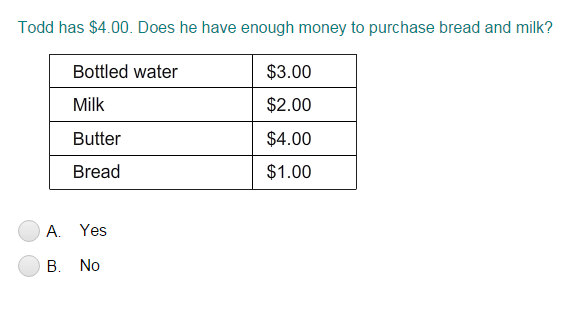- HOME
- QUIZZES
- UNITS OF MEASUREMENT
Making Change
Suppose Jake bought a hamburger for $1.30 with a $5.00 bill. He received the following change:

Let's check whether he received the right amount of change.
Subtract the cost of a hamburger from the amount that Jake paid.
| 4 | 10 | |||
| $ 5 | . | 0 | 0 | |
|
|
$ 1 | . | 3 | 0 |
| $ 3 | . | 7 | 0 |
So, Jake should get $3.70 in change.
Now, count the amount of change Jake received.
There are 3 one-dollar bills, 2 quarters, 1 dime, and 1 nickel.
First count the one-dollar bills by counting up by one three times:
$1.00, $2.00, $3.00
Now, to count the quarters, start at $3.00 and count up by twenty-five cents two times:
$3.25, $3.50
To count the dimes, start at $3.50 and count up by ten cents one time:
$3.60
To count the nickels, start at $3.60 and count up by five cents one time:
$3.65
Jake received $3.65 in change.
So, Jake did not receive the right amount of change.
A B C D E F G H I J K L M N O P Q R S T U V W X Y Z
Help
The correct answer is
Remember :
The smallest number is the one that comes first while counting.
Solution :
To arrange the given numbers in order from smallest to greatest, find the smallest number among all the given numbers.
21,27,23
21 is the smallest number.



